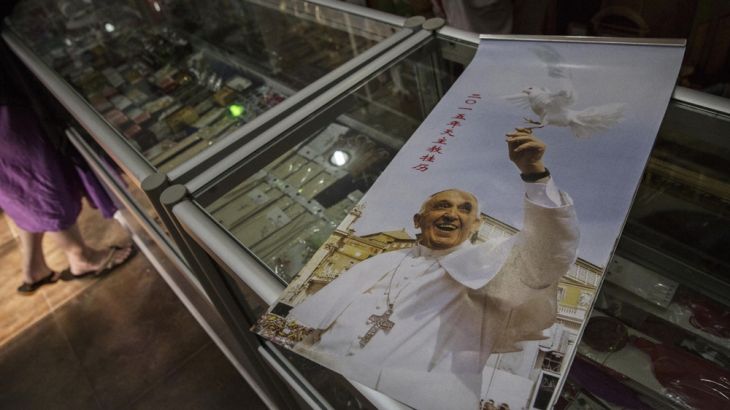
China and the Pope: A fresh start?
After decades of hostility, can two of the world’s most opaque organisations start anew or is this path doomed to fail?
A scramble for control and power within the churches serving China’s estimated 12 million Catholics has kept relations between the Vatican and the “Celestial Empire” fraught for almost 70 years.
China‘s crackdown on religious groups, especially of late, has not gone unnoticed as the Muslim minority Uighurs face life in internment and re-education camps, while Protestant churches are raided and closed down.
Keep reading
list of 4 itemsPalestinian Prisoner’s Day: How many are still in Israeli detention?
‘Mama we’re dying’: Only able to hear her kids in Gaza in their final days
Europe pledges to boost aid to Sudan on unwelcome war anniversary
It therefore comes as no surprise that many are wary about a pact between two of the world’s most secretive organisations.
An agreement, as launched by the governing Communist Party of China and leaders of the Vatican, provisionally resolves the issue of who gets to appoint bishops within the churches, with Pope Francis insisting on the final say.
China is the new frontier for the Catholic church. It has been so for centuries but especially now.
While many Catholics have welcomed the pact, others have outright condemned the agreement. One prominent critic, former Bishop of Hong Kong Cardinal Zen, has called it a “betrayal, evil and a sellout”.
In a previous interview with Talk to Al Jazeera earlier this year, as talks of a rapprochement became public, Cardinal Zen made his disapproval clear.
“How can you legitimise a schismatic church … they are completely under the guidance of the government. The church doesn’t change just because you legitimise all the bishops … If all the bishops, or the majority of the bishops, are the slaves of the communist regime, there is no improvement,” said the cardinal.
Whispers of classified meetings between high orders of the Vatican and Chinese officials have also triggered unease. Francesco Sisci, a sinologist and Italian academic living in Beijing, was one of the first journalists invited to interview the pope two years ago.
He says the pope has had China on the agenda for years, and his selection for one of the first interviews with the pontiff was strategic.
“He didn’t want to talk to me, he wanted to talk to China … he wanted to talk to Chinese people as they are; not necessarily Catholics, not necessarily [people] concerned with the same issues as people in the West … he wanted to reach out to the Chinese people … China is the new frontier for the Catholic church,” says Sisci.
Sisci also believes there is a good chance the Vatican will establish a more significant “foothold” in China, forecasting an official representative office in the country within as soon as a year’s time.
A papal visit could also be on the cards, according to Sisci, should the normalisation of relations continue.
What may result from a diplomatic relationship between a powerful leader, atheist, authoritarian communist and the first Jesuit pope of the largest Christian church in the world, is yet to be seen.
However, Sisci says there is a lot more to the actual pact than the “secret” meetings between Chinese and Vatican officials.
“There was a basic agreement on the appointment of a bishop about a decade ago. Now we are talking about a broader agreement about the life of a church in China and that could be a massive, historic watershed … for the first time ever in the history of China, the Chinese emperor – whatever you want to call it now, party secretary or the president – allows a foreign presence, that is the pope in this case, to have a say in the internal affairs of China,” says Sisci.
“It is massive.”